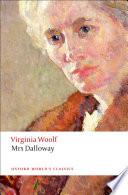Quotes from book
Mrs Dalloway

Mrs Dalloway is a novel by Virginia Woolf that details a day in the life of Clarissa Dalloway, a fictional high-society woman in post–First World War England. It is one of Woolf's best-known novels.

“Moments like this are buds on the tree of life. Flowers of darkness they are.”
Source: Mrs. Dalloway

“Rigid, the skeleton of habit alone upholds the human frame.”
Mrs Dalloway (1925)
Source: Mrs. Dalloway

Mrs Dalloway (1925)
Source: Mrs. Dalloway
Context: But to go deeper, beneath what people said (and these judgements, how superficial, how fragmentary they are!) in her own mind now, what did it mean to her, this thing she called life? Oh, it was very queer. Here was So-and-so in South Kensington; some one up in Bayswater; and somebody else, say, in Mayfair. And she felt quiet continuously a sense of their existence and she felt what a waste; and she felt what a pity; and she felt if only they could be brought together; so she did it. And it was an offering; to combine, to create; but to whom?
An offering for the sake of offering, perhaps. Anyhow, it was her gift. Nothing else had she of the slightest importance; could not think, write, even play the piano. She muddled Armenians and Turks; loved success; hated discomfort; must be liked; talked oceans of nonsense: and to this day, ask her what the Equator was, and she did not know.
All the same, that one day should follow another; Wednesday, Thursday, Friday, Saturday; that one should wake up in the morning; see the sky; walk in the park; meet Hugh Whitbread; then suddenly in came Peter; then these roses; it was enough. After that, how unbelievable death was! — that it must end; and no one in the whole world would know how she had loved it all.

“… she always had the feeling that it was very, very dangerous to live even one day.”
Source: Mrs. Dalloway

Mrs Dalloway (1925)
Source: Mrs. Dalloway
Context: What she loved was this, here, now, in front of her; the fat lady in the cab. Did it matter then, she asked herself, walking towards Bond Street, did it matter that she must inevitably cease completely; all this must go on without her; did she resent it; or did it not become consoling to believe that death ended absolutely? but that somehow in the streets of London, on the ebb and flow of things, here there, she survived. Peter survived, lived in each other, she being part, she was positive, of the trees at home; of the house there, ugly, rambling all to bits and pieces as it was; part of people she had never met; being laid out like a mist between the people she knew best, who lifted her on their branches as she had seen the trees lift the mist, but it spread ever so far, her life, herself.